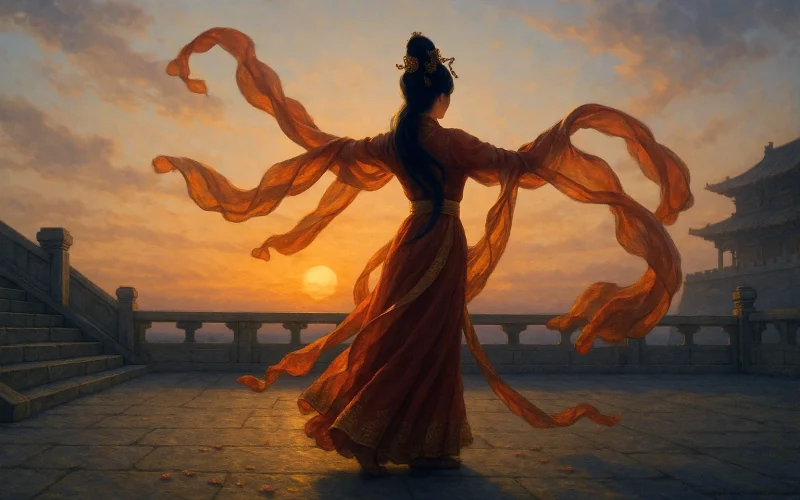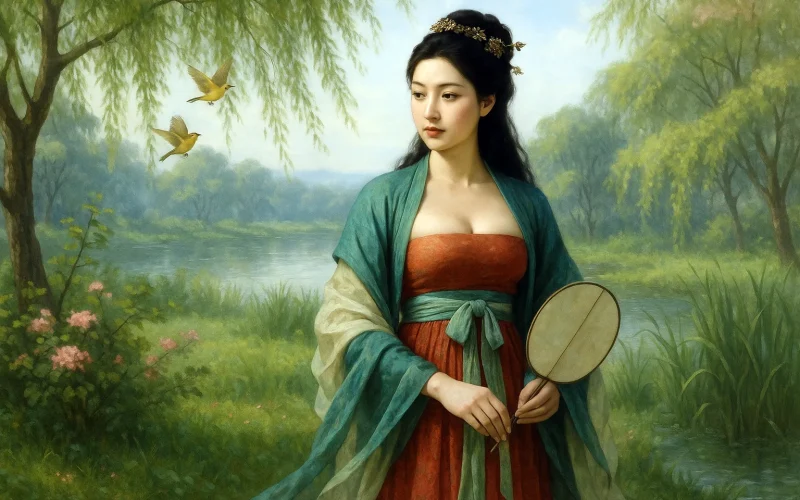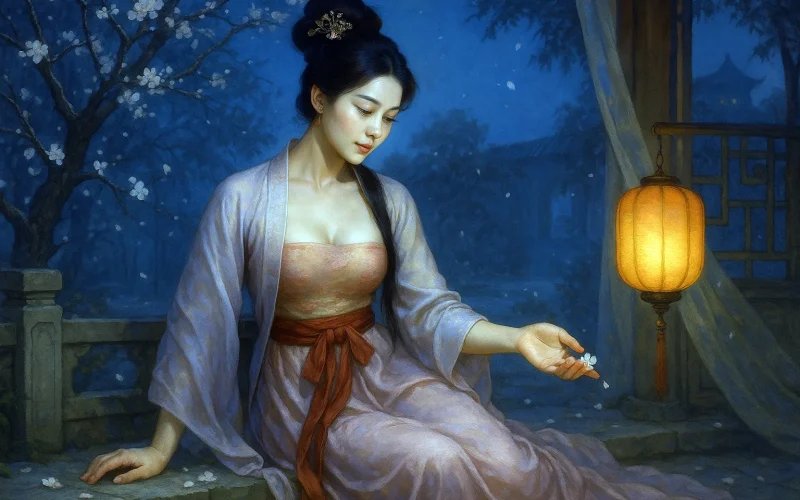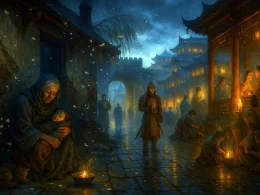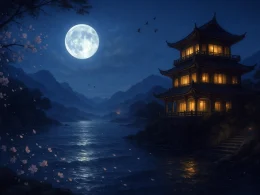By his last decree, I serve the departed king,
Forcing a smile and makeup, my brows I darken.
Years change the color of the tomb-side trees’ spring,
Yet his favor lives on in my dancing gown’s sheen.
An air of autumn chills the jade throne now,
The Bronze Terrace glows under the sunset’s glow.
Tear stains mark the well’s rail, silent and deep,
For whom are these long, long dancing sleeves to keep?
Original Poem
「铜雀妓」
刘方平
遗令奉君王,嚬蛾强一妆。
岁移陵树色,恩在舞衣香。
玉座生秋气,铜台下夕阳。
泪痕沾井干,舞袖为谁长。
Interpretation
This seven-character regulated verse by Tang poet Liu Fangping draws on a historical legend from the Wei Dynasty. It is said that Emperor Cao Pi ordered performers from the Bronze Sparrow Tower to guard the tomb of his father, Cao Cao. The figure of the "Bronze Sparrow performer" often symbolized neglected palace women or entertainers. Through this imagery, the poet depicts not only the sorrow of a once-favored consort watching over the tomb as her beauty fades but also reflects on the transience of glory and the impermanence of favor. Amid the Tang Dynasty’s extravagant social atmosphere, women with similar fates were not uncommon in the palace. This poem serves as the poet’s allegorical meditation on real life through a historical theme.
First Couplet: "遗令奉君王,嚬蛾强一妆。"
Yí lìng fèng jūnwáng, pín é qiǎng yī zhuāng.
By decree, she continues to serve the departed ruler;
Knitting her brows, she forces herself to apply makeup.
The poem opens with the performer’s obligation to serve despite her fallen status. The word "forces" (强 qiǎng) conveys deep reluctance, highlighting the contrast between her external compliance and inner anguish.
Second Couplet: "岁移陵树色,恩在舞衣香。"
Suì yí líng shù sè, ēn zài wǔyī xiāng.
Years pass, the tomb trees change their hue;
Favor lingers only in the scent of her dance robes.
This couplet shifts from external scene to inner emotion. The changing colors of the trees symbolize the passage of time, while the fragrance of the dance robes becomes a fleeting memory of past glory, emphasizing the desolation after the loss of favor.
Third Couplet: "玉座生秋气,铜台下夕阳。"
Yù zuò shēng qiūqì, tóng tái xià xīyáng.
An autumnal chill hangs over the jade seat;
Below the Bronze Sparrow Tower, the setting sun descends.
The atmosphere turns bleak and symbolic: the jade seat, once a symbol of authority and vitality, now emanates coldness; the tower, once glorious, is shrouded in the gloom of dusk. The contrast between past splendor and present decline underscores the impermanence of human affairs.
Fourth Couplet: "泪痕沾井干,舞袖为谁长。"
Lèi hén zhān jǐng gān, wǔ xiù wèi shuí cháng.
Tear stains soak the dried-up well railings;
For whom do her long dance sleeves now flutter?
The poem concludes with evocative imagery and a poignant question. Tears represent solidified grief; the dance sleeves, once a symbol of joy, now seem ironic in their solitude. The final question deepens the sense of futility and desolation.
Holistic Appreciation
Written from the perspective of a Bronze Sparrow Tower performer, the poem traces her fall from favor to abandonment. It begins with her forced performance, moves through memories of past favor, descends into the bleakness of the present, and ends with tears and unanswered questions, layering emotion from resignation to despair. The imagery transitions from splendor to desolation, leaving a lingering sense of melancholy.
This is not merely a poem of female grievance but also a meditation on the rise and fall of dynasties. It reminds readers that personal favor and imperial glory are as fleeting as dreams. Through the historical image of the Bronze Sparrow performer, Liu Fangping reflects the sorrowful fate of Tang palace women and implicitly laments the eventual fading of the High Tang’s golden age.
Artistic Merits
- Historical allegory with profound meaning: Using the legend of the Bronze Sparrow performer, the poem expresses both personal grievance and the impermanence of human affairs, broadening its thematic depth.
- Meaning through contrast: Past jade seats versus the setting sun, the scent of dance robes versus tear stains—the juxtaposition of glory and decline intensifies the tragic effect.
- Concise language, vivid imagery: Phrases like "forces herself to apply makeup," "scent of dance robes," "setting sun," and "tear stains" are striking and resonate emotionally.
- Interwoven scene and emotion, layered progression: From forced performance to memories of favor, then to decline, and ending with tears and dance, the poem forms a complete narrative and emotional arc.
Insights
This poem reveals that favor and glory, whether in beauty or power, are as fleeting as flowers in a mirror or the moon’s reflection. The lament that "years pass, the tomb trees change their hue; favor lingers only in the scent of her dance robes" speaks not only to women’s fates but also to the illusion and transience of worldly splendor. It reminds us to see through the impermanence of fame and fortune, avoid obsession with temporary favor or spectacle, and seek more enduring values and spiritual fulfillment in life.
About the Poet
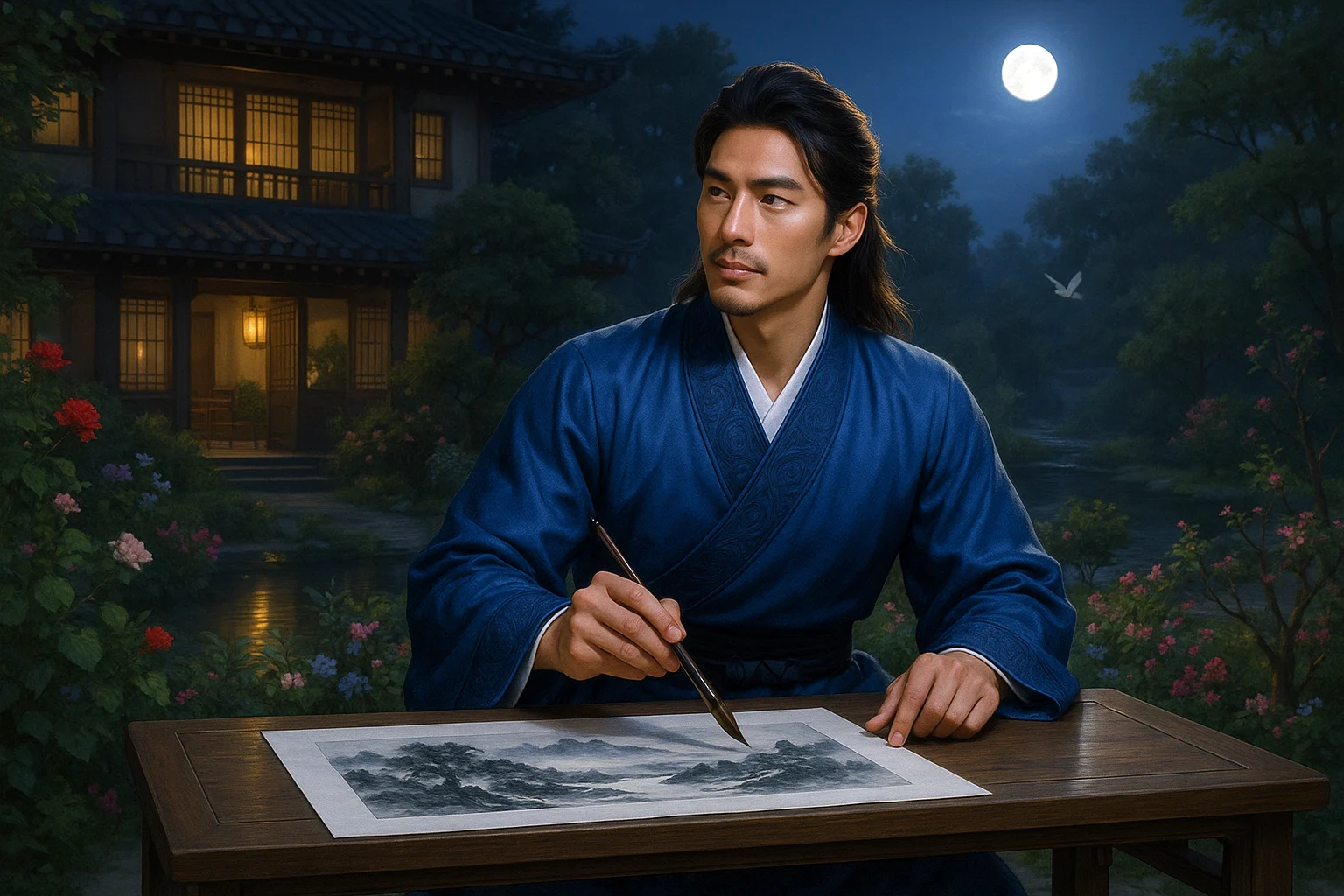
Liu Fangping (刘方平 c. 742 – c. 785), a native of Luoyang in Henan. A recluse-poet and painter spanning the High to Mid-Tang period, he distinguished himself with a delicate and subtle poetic style skilled in depicting boudoir lament and moonlit nights. Though only 26 of his poems survive in the Complete Tang Poems, works like Moonlit Night and Spring Lament secured his place in the canonical hall of Tang poetry. Hailed as "the pure voice of the High Tang and the herald of the Mid-Tang," his poetry fused the lucidity of the Qi-Liang style with Zen serenity, profoundly influencing the later ci lyric tradition and Heian-era Japanese women's literature.






